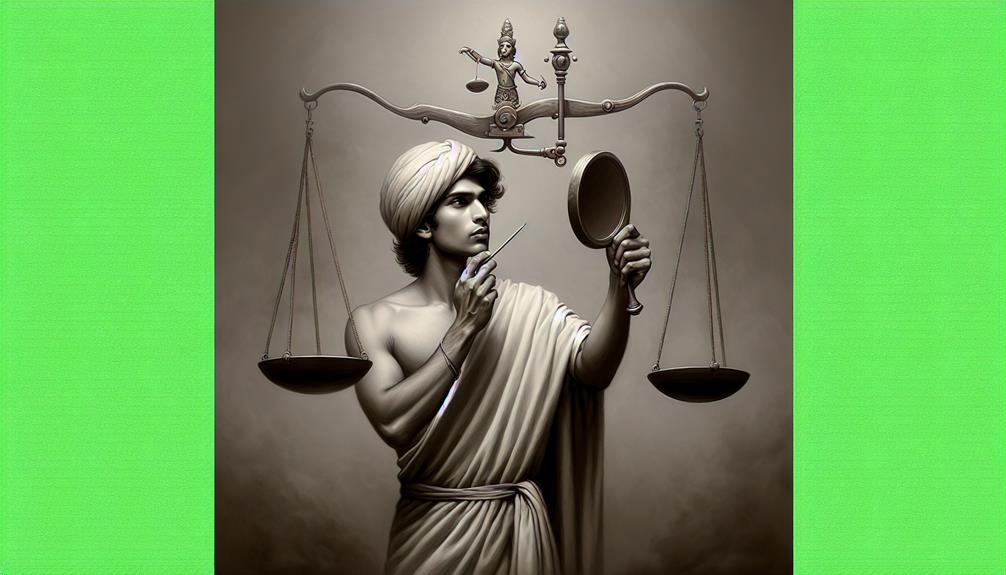What Is The Biggest Sin In Hinduism
In the vast tapestry of Hindu philosophy, the concept of sin is a complex and nuanced one. While Hinduism does not have a definitive list of sins akin to other religions, the idea of straying from one's dharma, or duty, is often considered a grave transgression.
What Is The Biggest Sin In Hinduism
However, beyond this lies a deeper principle – the notion of Ahankara, or ego, which can lead individuals astray from their true selves and their connection to the divine. Understanding the gravity of this spiritual misstep and the paths to atonement and redemption is a journey that many seekers embark upon in their quest for inner harmony and enlightenment.
What Is The Biggest Sin In Hinduism
Key Takeaways
- The biggest sin in Hinduism is going against dharma, which disrupts cosmic harmony.
- Actions like lying, stealing, and harming others hinder spiritual progress and invite negative karma.
- Upholding moral virtues and righteous living is crucial to avoid the biggest sin.
- A genuine desire for spiritual growth and adherence to dharma lead to atonement and redemption.
Understanding Sin in Hinduism
Understanding sin in Hinduism involves exploring the concept of karma and its implications on one's actions and consequences. In Hindu belief, karma is the law of cause and effect, where every action, whether good or bad, has a corresponding consequence. Sin, known as 'papa' in Sanskrit, refers to actions that go against dharma (righteousness) and create negative karma. These actions can lead to suffering and rebirth in lower states of existence.
What Is The Biggest Sin In Hinduism
Hindu scriptures emphasize the importance of living a righteous life to avoid accumulating negative karma. Sinful actions such as lying, stealing, harming others, and being unfaithful are considered detrimental to one's spiritual progress. Understanding sin in Hinduism involves self-reflection, repentance, and seeking forgiveness through prayers and rituals.
What Is The Biggest Sin In Hinduism
Moreover, the concept of sin is deeply intertwined with the idea of dharma, which guides individuals on the path of righteousness and moral duty. By following dharma and adhering to virtuous conduct, one can avoid sin and its negative consequences, ultimately leading to spiritual growth and liberation (moksha) from the cycle of rebirth.
What Is The Biggest Sin In Hinduism
Concept of Karma: Cause and Effect
The concept of karma in Hinduism serves as the foundational principle governing the law of cause and effect within individuals' actions and their subsequent repercussions.
What Is The Biggest Sin In Hinduism
- Actions: Every action, whether positive or negative, creates a corresponding energy that influences one's present life and future experiences.
- Intentions: Karma also takes into account the intentions behind actions. Good intentions can mitigate the effects of negative actions, while bad intentions can worsen the consequences of seemingly positive deeds.
- Rebirth: Hinduism believes in the cycle of birth, death, and rebirth, where karma plays a crucial role in determining the circumstances of each subsequent life. Positive karma leads to a better rebirth, while negative karma results in a more challenging existence.
Understanding karma encourages individuals to act with mindfulness and compassion, knowing that their deeds have lasting implications not only in this life but in the lives to come. By aligning actions with positive intentions, one can strive to create a future filled with harmony and growth.
What Is The Biggest Sin In Hinduism
Violating the Laws of Dharma
Violating the Laws of Dharma is considered a grave transgression in Hinduism, as it disrupts the moral order and harmony essential for a righteous life. Dharma encompasses a set of principles that govern an individual's duty, morality, and conduct in society. By adhering to Dharma, one upholds righteousness, social order, and cosmic harmony.
In Hinduism, the violation of Dharma is believed to lead to negative consequences, both in this life and the next. It is seen as a disruption of the natural balance and a disregard for one's responsibilities towards oneself, society, and the universe. When individuals act against Dharma, they create disharmony, sow seeds of discord, and invite suffering into their lives.
To avoid the pitfalls of violating Dharma, Hindus are encouraged to lead a life guided by moral virtues such as truthfulness, compassion, honesty, and selflessness. Upholding Dharma is not just a personal duty but a collective responsibility that ensures the well-being of all beings and the preservation of cosmic order.
Impact of Ahankara: Ego
Ahankara, or ego, plays a significant role in Hinduism and can have profound impacts on an individual's spiritual journey and interactions with the world around them. Ego can lead individuals to prioritize themselves above others, causing disharmony and distancing them from their true selves and their connection to the divine. The impact of Ahankara, if unchecked, can hinder personal growth and spiritual progress.
To address the negative effects of ego in Hinduism, individuals are encouraged to:
- Practice Self-Reflection: By introspecting and understanding the root causes of ego within oneself, individuals can begin to overcome its influence and cultivate humility.
- Serve Others Selflessly: Engaging in acts of service without expecting personal gain helps diminish ego by shifting the focus towards the well-being of others and fostering compassion.
- Seek Guidance from Spiritual Teachers: Learning from enlightened spiritual mentors can provide valuable insights and guidance on how to transcend ego and attain spiritual liberation.
Paths to Atonement and Redemption
Embarking on a journey of introspection and self-examination can pave the way for individuals seeking paths to atonement and redemption in Hinduism. Within Hinduism, the concept of atonement and redemption is deeply rooted in the idea of karma, the law of cause and effect. To atone for past wrongdoings and seek redemption, individuals often turn to practices such as meditation, prayer, and selfless service (seva). By engaging in these practices with sincerity and humility, individuals aim to purify their minds and hearts, thus breaking free from the cycle of negative karma.
Additionally, seeking guidance from spiritual mentors and participating in religious rituals, such as yajnas and pujas, are common paths to atonement and redemption in Hinduism. These rituals not only serve as a means of seeking forgiveness from the divine but also as a way to realign oneself with the cosmic order (dharma). Ultimately, the journey to atonement and redemption in Hinduism is a personal and transformative process that requires self-awareness, reflection, and a genuine desire for spiritual growth.
Frequently Asked Questions
How Do Different Hindu Sects Interpret Sin and Its Consequences Differently?
Different Hindu sects interpret sin and its consequences based on their philosophical beliefs, scriptures, and practices. Each sect may prioritize different sins and have varying degrees of severity attached to them.
Some sects may emphasize the concept of karma and the law of cause and effect, while others may focus on the importance of dharma and righteousness.
Are There Any Specific Rituals or Practices to Atone for Sins in Hinduism?
In Hinduism, there are specific rituals and practices to atone for sins. These may include acts of repentance, such as performing penance, offering prayers, making offerings at temples, participating in religious ceremonies, and seeking forgiveness from deities.
Additionally, acts of charity, selfless service, and seeking spiritual guidance from gurus are also considered ways to cleanse oneself of sins and purify the soul.
Can Someone Be Born Into a Lower Caste as a Result of Past Life Sins in Hindu Belief?
In Hindu belief, the concept of karma suggests that one's actions in past lives can influence their current circumstances, including being born into a particular caste. This understanding is not about punishment but rather about the consequences of one's deeds.
Just as a seed sown in fertile soil is likely to flourish, good actions lead to positive outcomes, while negative actions may result in a lower caste birth.
How Does the Concept of Maya (Illusion) Play a Role in Understanding Sin in Hinduism?
In Hinduism, the concept of Maya, or illusion, holds significance in understanding sin. Maya refers to the temporary, illusory nature of the material world, leading individuals to focus on the transient rather than the eternal.
This illusion can lead one to engage in actions that are considered sinful, as it distracts from the path of righteousness and spiritual growth.
Recognizing and transcending Maya is key to avoiding sinful behaviors and progressing on the spiritual journey.
Is There a Difference Between Intentional and Unintentional Sins in Hindu Philosophy?
In Hindu philosophy, intentional and unintentional sins are differentiated based on the individual's level of awareness and intent behind their actions.
Intentional sins, like knowingly causing harm or acting with malice, are considered more severe due to the conscious choice involved.
Unintentional sins, on the other hand, stem from ignorance or negligence.
The distinction between the two allows for a nuanced understanding of karma and the moral responsibility attached to one's deeds.
Conclusion
In the intricate web of Hinduism, the biggest sin is seen as violating the laws of Dharma and succumbing to the destructive force of Ahankara, or ego. This leads to negative karma and disrupts the balance of cause and effect.
However, through paths of atonement and redemption, individuals can seek to cleanse their souls and restore harmony with the universe. Like a river flowing back to the ocean, the journey of overcoming sin is a vital part of the spiritual cycle.

